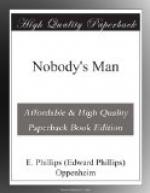There was a little murmur of applause. Miller was once more on his feet.
“I claim,” he said, “that this is neither the time nor the place to spring upon us an utterly new method of dealing with Labour questions. What you propose seems to me a subtle attack upon the trades unions themselves. They have been the guardians of the people for the last fifteen years, and even though some strikes have been necessary and although all strikes may not have been successful, yet on the whole the trades unions have done their work well. I shall not accept, in the event of my election, the programme which Mr. Dartrey has laid down, unless I am elected with a special mandate to do so.”
Saunderson rose to his feet, a man of different type, blunt of speech, rugged, the typical working-man’s champion except for his voice, which was of unexpected tone and quality.
“Mr. Weavel and the rest of you,” he said, “I differ from Miller. That’s lucky, because you can vote now not only for the man but the principle. I have loathed strikes all my life, just because I am political economist enough to loathe waste and to hate to see production fettered,—that is, where the fruits of the production are shared fairly with Labour. I like Dartrey’s scheme and I am prepared to stand by it.”
Saunderson sat down. Dartrey and Tallente left the room while the business of voting went on. Dartrey had a private room of his own in the rear of the building and he and Tallente made their way there.
“Those men have a good deal to decide,” Tallente reflected. “It’s queer how the balance of things has changed. I don’t suppose any Cabinet Council for years has had to tackle a more important problem.”




